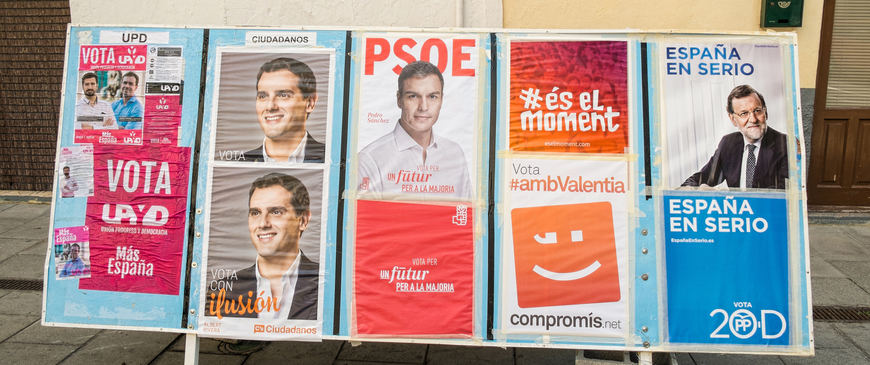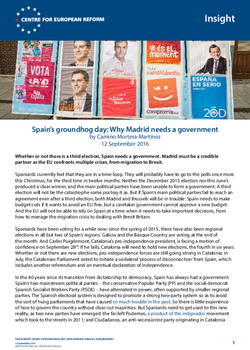
Spain's groundhog day: Why Madrid needs a government
Whether or not there is a third election, Spain needs a government. Madrid must be a credible partner as the EU confronts multiple crises, from migration to Brexit.
Spaniards currently feel that they are in a time-loop. They will probably have to go to the polls once more this Christmas, for the third time in twelve months. Neither the December 2015 election nor this June’s produced a clear winner, and the main political parties have been unable to form a government. A third election will not be the catastrophe some portray it as. But if Spain’s main political parties fail to reach an agreement even after a third election, both Madrid and Brussels will be in trouble: Spain needs to make budget cuts if it wants to avoid an EU fine, but a caretaker government cannot approve a new budget. And the EU will not be able to rely on Spain at a time when it needs to take important decisions, from how to manage the migration crisis to dealing with Brexit Britain.
Spaniards have been voting for a while now: since the spring of 2015, there have also been regional elections in all but two of Spain’s regions. Galicia and the Basque Country are voting at the end of the month. And Carles Puigdemont, Catalonia’s pro-independence president, is facing a motion of confidence on September 28th. If he fails, Catalonia will need to hold new elections, the fourth in six years. Whether or not there are new elections, pro-independence forces are still going strong in Catalonia: in July, the Catalonian Parliament voted to initiate a unilateral ‘process of disconnection’ from Spain, which includes another referendum and an eventual declaration of independence.
In the 40 years since its transition from dictatorship to democracy, Spain has always had a government. Spain’s two mainstream political parties ‒ the conservative Popular Party (PP) and the social-democrat Spanish Socialist Workers Party (PSOE) ‒ have alternated in power, often supported by smaller regional parties. The Spanish electoral system is designed to promote a strong two-party system so as to avoid the sort of hung parliaments that have caused so much trouble in the past. So there is little experience of how to govern the country without clear-cut majorities. But Spaniards need to get used to this new reality, as two new parties have emerged: the far-left Podemos, a product of the indignados movement which took to the streets in 2011; and Ciudadanos, an anti-secessionist party originating in Catalonia which tries to fill the vacuum in the political centre. Both have risen dramatically since the 2011 general election, and are now Spain’s third and fourth political forces.

The process of forming a government is regulated by a single article of Spain’s 1978 Constitution. Article 99 says that a candidate has two attempts to become prime minister. At the first attempt, they need an absolute majority of members of Parliament to vote for them. If they fail, they can try one more time, 48 hours later. This time, to be successful, the candidate only needs a simple majority of those voting, regardless of any abstentions. Otherwise, the clock starts ticking, and politicians have two months to find an alternative candidate for the post of prime minister, who commands a majority in Parliament. If they cannot, the King dissolves Parliament and calls for new elections, which must be held 53 days after the dissolution. After the December 2015 elections, the PSOE leader Pedro Sanchez tried, and failed, to assemble a parliamentary majority. After the vote in June 2016, it was the turn of incumbent Mariano Rajoy. He did not succeed, either.
On the face of it, the lack of a government has not affected Spain much: the economy seems to be doing fine and unemployment is falling. The various layers of public bureaucracy take care of most daily government business. Spaniards could be forgiven for not missing their government. But there are some important matters a caretaker government cannot deal with, including the budget and international negotiations. And both are of crucial importance for Spain and the EU at present.
In July, Madrid narrowly escaped an EU fine for its budget deficit, after failing to implement sufficient measures to bring the deficit below the 3 per cent threshold. (Spain had government deficits of 5.9 per cent of GDP in 2014 and 5.1 per cent of GDP in 2015.) The Commission eventually dropped its plans for a fine after political pressure from Berlin, Paris and Rome. But Spain will still need to cut public spending by €10 billion over the next two years. The Spanish government is supposed to explain how it intends to do that in its budget for 2017, which it is due to submit to the European Commission by October 15th. But if, as it seems likely, there is no new government before the deadline, Prime Minister Rajoy will only be able to roll over this year’s budget. The issue of fines for Spain—whether or not they make sense economically—will thus not go away. Other EU countries, many governed by coalitions, will eventually lose patience with Spanish politicians’ failure to reach an agreement.
If Spain’s main political parties fail to reach agreement both Madrid & Brussels will be in trouble
The second thorny issue is Spain’s role in the many crises facing Europe, such as migration, terrorism, the weakness of the eurozone and the fallout from Brexit. Spain’s voice is crucial in all four matters. First, as one of Africa’s gateways to Europe, Spain has been a hotspot in the fight against irregular migration and the reinforcement of the Schengen area’s external borders. Second, because of its experience with Basque separatist group ETA, Madrid is one of the most active states in the EU’s efforts to combat terrorism. Third, after implementing many of the reforms demanded by the eurozone, Madrid will be a crucial and credible voice in the eurozone's future reform processes. Finally, Spain has a very important role to play in the Brexit negotiations: the long-running conflict between Spain and the UK over Gibraltar has been kept in check by EU membership; and Britain’s prime minister, Theresa May, also has to balance her desire to cut the numbers of EU migrants in the UK with the rights of the large numbers of British citizens living in Spain. Perhaps more helpfully for May, because of its own regional conflicts, Madrid is also a fierce opponent of allowing an independent Scotland into the EU.
Of course, a caretaker government can still take decisions and define Spain’s positions in international forums. But the poor relationship between Rajoy and the other party leaders makes it very difficult for Spain to have a coherent approach to matters of international relevance. Rajoy has little support outside his own party, and each decision taken by his cabinet risks being reversed by Parliament. This was most evident in March, when Rajoy failed to seek the support of Spain’s lower chamber before signing the EU-Turkey migration agreement. MPs threatened to force a parliamentary vote on the deal, which would have resulted in the withdrawal of Spain’s support for the agreement. Eventually, this did not happen, but Rajoy was forced to explain his government’s position in Parliament.
Spaniards should not be afraid of going to the polls again, if that is what it takes to get politicians to finally reach an agreement. But whatever happens (a third election, or an agreement between parties that removes the need for one), political leaders must find a way to work together. Politicians should go back to the idea of a grand coalition between PP, PSOE and Ciudadanos. (Podemos’ erratic behaviour, and its willingness to accommodate Catalonia’s secessionist ambitions, have made it an unacceptable partner for the other national parties). A grand coalition would offer the chance to bring about much needed changes in Spain (from constitutional change to reforming the labour market). It would end the illusion of a neat but clearly outdated two-party system. Co-operation across the aisle would also show Spaniards that they should not be afraid of hung parliaments. Many in Spain complain of the ‘blame and shame’ political culture which has prevailed over the past 40 years: political parties seem more interested in blaming their opponents than in advancing the country’s interests. In the short-medium term, a grand coalition would prove to Spaniards that politicians can work together when the situation so requires. In the longer term, though, such a coalition may boost support for the political extremes. But this is a risk Spanish politicians should be willing to take so that they can end the country’s political deadlock.
Together, PP, PSOE and Ciudadanos would have 254 seats, well over the 176 needed to form a government. In March, PSOE and Ciudadanos agreed on a list of over 200 reforms. In August, PP and Ciudadanos agreed on a list of 150 reforms. (Both lists are rather similar, although there are some differences, notably on labour market reform). It should not be difficult, therefore, for PSOE, PP and Ciudadanos to agree on a common list of reforms which could bring about substantial change in the country. On that basis, PSOE and Ciudadanos should support a PP-led government.
Third election will solve little unless political leaders show willingness to compromise & reform
So far, the PP has not been able to bring the other two parties together in a coalition because of their mutual dislike of Mariano Rajoy. He is the single largest obstacle standing in the way of forming a coalition government. Because PSOE would be the biggest loser from a grand coalition (many of its voters still think of the PP as ‘the enemy’ and may well turn to radical-left Podemos), PP needs to make the single concession it seems unwilling to offer: Mariano Rajoy should step down and let someone else head the government. Only then would a grand coalition be palatable to both socialist voters and PSOE’s all-powerful regional leaders. The conservatives would also benefit from Rajoy’s exit: his failure last week to get enough votes to be appointed prime minister amounts to a vote of no confidence. It will be almost impossible for Rajoy, even if he achieves a relatively comfortable victory in a hypothetical third election, to govern the country without the parliament’s trust. A fresh face would also help PP’s public image: the party has been haunted by many corruption scandals in recent times. Rajoy’s lenient attitude to some in his party who are tied up in these scandals has damaged his reputation and that of his cabinet.
While politicians in Madrid are busy fighting over who to blame for Spain’s lack of government, a unilateral independence process is underway in Barcelona. Elsewhere, the EU is headed towards some of the most challenging months in the history of the European project. Brexit will make Spain proportionately more important inside the EU, as it is the bloc’s fourth largest country. If its dysfunctional politics continue, however, it will not be able to make its weight felt in Brussels. The lengthy process of finding a government may mark the coming of age of Spain’s relatively young democracy. If, to find an agreement, Spanish politicians need a third election, so be it. But a third election will solve little unless political leaders show their willingness to compromise and reform. Otherwise, Spain would have gone without a government for over a year for nothing. And then it might well go without one for some time to come.
Camino Mortera-Martinez is a research fellow and Brussels representative at the CER.


Add new comment